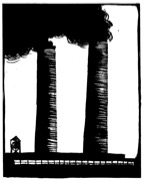Why don't they just burn it?" some folks ask, mistakenly believing fire is the logical answer to trash accumulation, especially when landfills become mountains.
The landfill dilemma has long been with us because we simply have refused to stop making stuff to throw away. But, of course, there is no "away" when you live on a sphere. Unfortunately that means the reincarnation of trash to ash is just a transformation, not a true eradication.
Lately the landfill issue has been in the news again along with the reality check of our geology in this part of the state. We're in a poor location for digging more holes and piling stuff higher, since we are sitting on top of Swiss cheese-like karst limestone, which is not good for preventing leaking pollutants going underground.
Deciding what to do with waste requires understanding the consequences of whichever goal is being pursued. Incineration accomplishes a couple of things: volume reduction and, sometimes, a reduction in the distance waste is transported. Those two goals, however, come with very serious consequences.
Merchants of incineration generally promote turning waste into energy production, which they say would avoid landfilling. These attributes sound good too, but again, there's a flip side of considerations often ignored in the blind pursuit of simple solutions.
People who oppose incineration don't do it because they like landfills. To the contrary, landfills are environmentally horrid. They leach into water sources, produce methane gases and sickening smells, and sometimes catch on fire. Neighbors to some landfills believe the trash mounds are rarely monitored as closely as promised by inspectors, rules aren't enforced and property values are impacted. The heaps stand as monsters in our world, the in-our-face proof that we are wasting the resources we've utilized to get where we are today.
Plastics, metals, wood, food, clothing, paper, building materials, appliances, tires, batteries, electronics, diapers, etc., all took energy, raw materials, manufacturing industries and transportation in the life cycles of their creation before these products reached us. Incineration is not recycling, in spite of greenwash slogans, but destruction of these resources.
Incineration's deal-with-the-devil occurs when we shrink waste to ash. Converting unknowns in an extremely high temperature fire results in unknown emissions because mixed municipal waste is made up of unknown fuels. People, who study what's emitted, depend on analysis of gas, particulates and ash for answers, but no burning machines can be built to fit every fuel in municipal solid waste. For example, finally the world is waking up to PFAS "forever" chemicals that are in thousands of products. Yet, study of incinerated chemical compounds is in its infancy, according to Environmental Health News. (https://www.ehn.org/pfas-air-pollution-2656977959.html)
Carbon dioxide and nitrogen oxide are emitted in incineration as well as particulates, which are so small they can make their way deep into our lungs. We tend to forget that the smaller things become, the more impossible they are to identify, find or retrieve. At least with trash, we usually know what it is and where it is. But once nanoparticles, molecules, liquids, gases, powders and chemicals float in the wind, join with water, enter soil and food and us, there's no turning back.
Perhaps the worst man-made combustion creation is dioxin, which doesn't start out in trash, but is cooked into existence. It, along with furans, mercury, arsenic, cadmium, lead, etc., supply a recipe of non-retrievable toxins in the fly and bottom ash of incinerators. (https://archive.epa.gov/epawaste/hazard/wastemin/web/pdf/dioxfura.pdf)
That ash is hazardous waste and must be buried in special, expensive landfills or processed into a stabilized form that hopefully won't leach ... for eternity. More pollution (both air and water) is no solution.
Filters and treatment processes were supposedly "state of the art" 35 years ago when Fayetteville had its battle over incineration, and today promoters are still touting their latest tech as "state of the art." Unfortunately millions, maybe billions, have been spent globally in researching and developing different systems to make the state of incineration safe as we keep adding on mixed waste. Some methods even use more energy to burn waste than the waste burning generates.
Incinerators are incredibly expensive and if revenue bonds are sold to pay them off, there is only political incentive to feed the beast instead of starve it of waste fuel. With global climate warming, poles melting as well as plant and animal extinctions increasing, this is hardly the time to add more fuel to the global fire. We have to come to terms with our wasteful behaviors.


